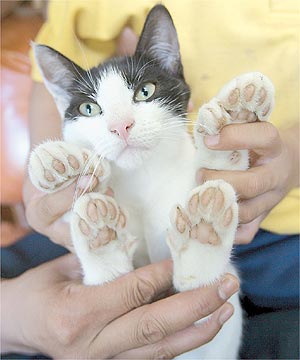 She seemed like any other ordinary three-month-old kitten but she wasn't. Finally, her human family noticed there was something different about her. A closer examination of the frisky feline's paws revealed that this kitten had 26 toes -- so they named her "extra".
She seemed like any other ordinary three-month-old kitten but she wasn't. Finally, her human family noticed there was something different about her. A closer examination of the frisky feline's paws revealed that this kitten had 26 toes -- so they named her "extra".
"We counted and then recounted but we had it right the first time," said Kaelene Gerrard, who lives with her partner Eli Eliu and daughters Mercy, six, and 12-year-old Shardae in New Zealand.
Extra has seven toes on each front paw and six toes on each back paw - instead of the normal five on the front feet and four on the back.
Staff at Glendowie Veterinary Clinic in Auckland say Extra's trait is relatively common and an inherited genetic condition called polydactyly. It usually produces six toes, so Extra is that extra little more special. Polydactyly, or extra digits, in cats is most common in parts of the United States' east coast and in south west England. It is a naturally occurring genetic variation and has even been found in fossil reptiles.
Some cat owners say the innermost extra toes on the front paws are often opposable and some use them with quite startling proficiency to manipulate small objects with almost human dexterity.
Cited story and image source.
- Log in to post comments


I can't resist cat blogging.
On the Origin of the Kzinti anyone?
Kzinti only had 4 digits (including the opposable thumb) on each paw ... that's why their numbering system was base 8.
I've known a few friends cats who had extra opposable digits. All were startling good climbers - more like aboreal monkeys than cats in their ability to negotiate trees, ropes, and playground equipment, though of course they did not swing as some monkeys do.
Back in my college years, I heard about an another feline mutataion called "double paws" -- yep, double the number of digits. Some member of the old "bandykin" list (I don't remember who) claimed to have a cat with both mutations -- a total of 48 toes. I never saw that cat, though.
The Hemingway Museum in Key West (on Key West?) is overru-- er, overflowing with polydactylic cats. This is a fairly common, as these things go, condition.